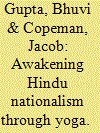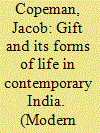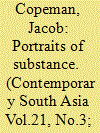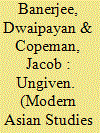| Srl | Item |
| 1 |
ID:
168565


|
|
|
|
|
| Summary/Abstract |
Alongside Prime Minister Narendra Modi, whose politics he explicitly endorses, Swami Ramdev is frequently depicted as the contemporary face of neo-Hindutva nationalism in India. This essay concerns specific, but interrelated, aspects of the Swami Ramdev ‘phenomenon’ and their particular relation to Hindu nationalism. We bracket the headline-stealing anti-Islamic and pro-Modi proclamations in order to focus on the nuances of the relationship between his yoga and a majoritarian Hindutva agenda and examine the specifics of Ramdev’s teachings and campaigns. We suggest that the (Hindu) nationalism of Ramdev and his organisations is formed less of propositional or even affective content but instead is a condition emerging from its particular prescription and practice of yoga; it is a condition of the body. In this way, yoga, as it is reproduced at the site of the individual body, produces the national(ist) activist subject.
|
|
|
|
|
|
|
|
|
|
|
|
|
|
|
|
| 2 |
ID:
106498


|
|
|
| 3 |
ID:
124956


|
|
|
|
|
| Publication |
2013.
|
| Summary/Abstract |
This essay examines the way extractions of human blood - for medical donations, portrait paintings, and petitions - have come to form a significant means of political communication (particularly as a means of political protest) throughout India, focusing in particular on a case study from the south of a karate teacher and artist who, through painting multiple portraits of the Tamil Nadu Chief Minister with his blood, sought land for his karate school. The second half of the essay explores wider features of India's 'sanguinary politics', focusing in particular on ways in which publicly witnessed deployments of political activists' own blood once seemed to promise both intensification and purification of mass political idioms. It also considers how and why this promise has largely remained unfulfilled.
|
|
|
|
|
|
|
|
|
|
|
|
|
|
|
|
| 4 |
ID:
158572


|
|
|
|
|
| Summary/Abstract |
Drawing on field research principally from contexts of medical blood donation in North India, this article describes how gifts that are given often critique—by obviation—those that remain ungiven: the care not provided by the Indian state for Bhopal survivors, the family members unwilling to donate blood for their transfusion-requiring relative, and so on. In this way, giving can come to look like a form of criticism. The critiques that acts of giving stage are of absences and deficits: we present cases where large paper hearts donated by survivors of the 1984 Bhopal Gas Disaster to the prime minister of India signal his lack of one, where donated human blood critiques others' unwillingness to do so, where acts of blood donation critique and protest communal violence, and where similar acts of giving over simultaneously highlight a deficit in familial affects and an attempt to resuscitate damaged relational forms. We thus illustrate how critique can operate philanthropically by way of partonomic relations between the given and not-given.
|
|
|
|
|
|
|
|
|
|
|
|
|
|
|
|